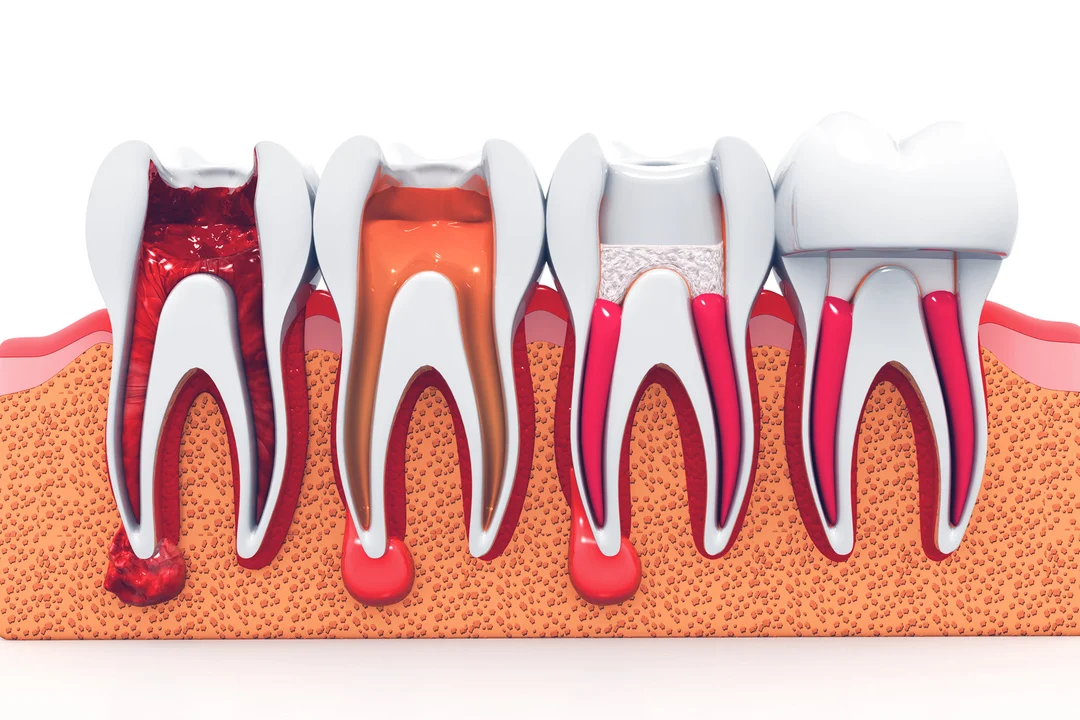Root canal treatment at Glenvale Dental Group, Glen Waverley
Do you have a severe toothache that doesn't respond to pain medication or worsens when biting or chewing? You might need a root canal treatment.
Root canal treatment is a highly effective procedure designed to save a tooth that is severely infected or damaged. At Glenvale Dental Group, our skilled and experienced team is dedicated to providing gentle and professional care to relieve your pain and restore your oral health.
What is a root canal treatment?
Root canal treatment is a dental procedure that involves removing infected or damaged pulp from inside a tooth, cleaning and disinfecting the area, and then filling and sealing it to prevent further infection.


Symptoms Indicating the Need for Root Canal Treatment
If you experience any of the following symptoms, you may require a root canal treatment:
Severe Toothache
Persistent, intense pain that may worsen with chewing or pressure.
Sensitivity
Prolonged sensitivity to hot or cold temperatures, even after the source is removed.
Swelling
Swelling and tenderness in nearby gums or face.
Discoloration
Darkening of the tooth, indicating possible nerve damage.
Pus Drainage
Presence of pus or an abscess in the gums, indicating infection.
Persistent Pimples
Recurring pimples or boils on the gums near the affected tooth.
The Root Canal Procedure
At Glenvale Dental Group, we follow a precise and gentle approach to ensure your comfort and the success of the root canal treatment:
1. Diagnosis and Consultation
During your initial visit, our dentist will examine your tooth, take X-rays, and discuss your symptoms to confirm the need for a root canal.
2. Anesthesia
Local anesthesia is administered to numb the affected area, ensuring you are comfortable and pain-free throughout the procedure.
3. Access and Cleaning
A small opening is made in the crown of the tooth to access the infected pulp. The infected or damaged pulp is carefully removed, and the root canals are thoroughly cleaned and disinfected.
4. Filling and Sealing:
The cleaned root canals are filled with a biocompatible material called gutta-percha. The opening is then sealed to prevent further infection.
5. Restoration:
A temporary filling is placed, and in a subsequent visit, the tooth is restored with a permanent filling or crown to protect and strengthen it.
6. Follow-Up Care:
Regular follow-up appointments are scheduled to monitor the healing process and ensure the success of the treatment.
Schedule Your Consultation Today
If you are experiencing any symptoms that may indicate the need for a root canal, don't wait to seek treatment. Schedule a consultation with Glenvale Dental Group today. Our compassionate and professional team is here to provide the highest standard of care, ensuring your comfort and the best possible outcomes for your oral health.

Dentists in
Glen Waverley
Glenvale Dental Group
Near "The Glen" shopping centre
240 Springvale Rd Glen Waverley VIC 3150
03 9802 2899
reception@glenwaverleydental.com.au
Hours (subject to change)
Mon, Wed, Thurs 8am-6pm
Tues 8am-7pm
Fri 8am-5.30pm
(may change)
Emergencies: Our home phone numbers are on our appointment cards.
Areas We Serve
Glen Waverley / Mount Waverley / Wheelers Hill / Mulgrave / Notting Hill / Wantirna South / Scoresby / Vermont South Clayton / Burwood East / Rowville / Glen Iris / Chadstone / Ashwood / Forest Hill / Vermont / Knoxfield
Top 5 Reasons Why You Should Get Root Canal Treatment
- 1. Cost-Effective Solution: Root canal treatment is often more cost-effective than extracting a tooth and replacing it with an implant or bridge. It can save you money in the long run by avoiding more complex and expensive procedures.
- 2. Quick Recovery Time: With modern techniques and anesthesia, root canal treatments are relatively quick and minimally invasive, leading to a faster recovery time compared to extraction and replacement options.
- 3. Preserve Jawbone :Integrity Keeping your natural tooth through a root canal helps preserve the integrity of your jawbone. Tooth extraction can lead to bone loss over time, but maintaining the natural tooth keeps the bone structure intact.
- 4. Maintain Natural :Chewing and Biting Sensation Root canal treatment allows you to retain the natural feel of your tooth when chewing and biting, providing a more comfortable and natural eating experience compared to artificial replacements.
- 5. Prevent Complications: Addressing tooth infections early with a root canal can prevent more severe complications such as abscesses, which can lead to significant pain and health issues if left untreated.
FAQs About Root Canal Treatment at Glenvale Dental Group
You may need a root canal if you experience severe tooth pain, prolonged sensitivity to hot or cold, swelling or tenderness in the gums, discoloration of the tooth, or persistent pimples on the gums.
Root canal treatment is performed under local anesthesia, so you should not feel pain during the procedure. Most patients report that it feels similar to getting a regular filling. Any discomfort afterward can typically be managed with over-the-counter pain medication.
The duration of a root canal procedure varies depending on the complexity of the case. Generally, it can be completed in one to two visits, with each visit lasting about 60 to 90 minutes.
After a root canal, your tooth may feel sensitive for a few days, which can be managed with pain relievers. You should avoid chewing on the treated tooth until it has been permanently restored with a filling or crown.
With proper care, a root canal-treated tooth can last a lifetime. It's important to maintain good oral hygiene and visit your dentist regularly for check-ups and cleanings.
The primary alternative to a root canal is tooth extraction. However, extracting a tooth can lead to other dental issues and may require replacement with an implant, bridge, or denture, which can be more costly and time-consuming.
Maintaining good oral hygiene, including regular brushing, flossing, and dental check-ups, can help prevent tooth decay and infections that might lead to the need for a root canal. Avoiding excessive sugar and wearing a mouthguard during sports can also reduce the risk.





